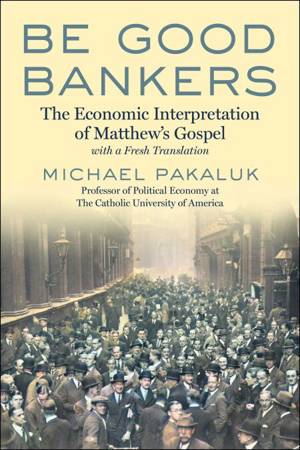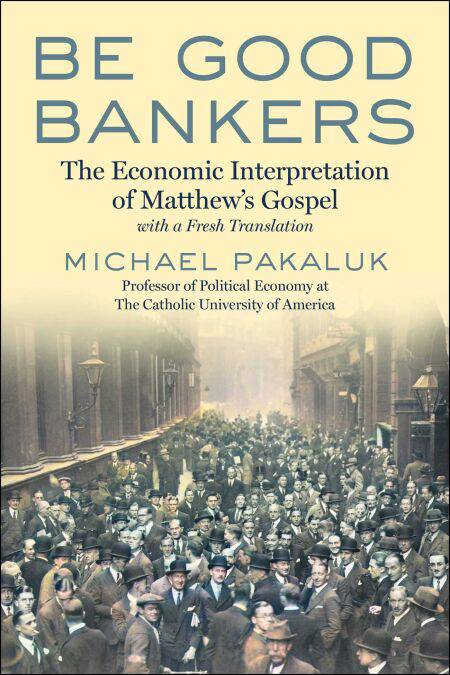
- Retrait gratuit dans votre magasin Club
- 7.000.000 titres dans notre catalogue
- Payer en toute sécurité
- Toujours un magasin près de chez vous
- Retrait gratuit dans votre magasin Club
- 7.000.0000 titres dans notre catalogue
- Payer en toute sécurité
- Toujours un magasin près de chez vous
Be Good Bankers EBOOK
The Economic Interpretation of Matthew's Gospel, with a Fresh Translation
Michael Pakaluk
Ebook | Anglais
24,59 €
+ 24 points
Description
Discover the inherent connections between commerce, the Christian faith, and the divine economy through this groundbreaking interpretation of Matthew’s Gospel.
Suppose that the author of the Gospel of Matthew was an ambitious tax collector who was intricately familiar with the best practices of Roman banking, accounting, and contract law. As a result, wouldn’t we expect to see a unique account of Jesus’s life, death, and resurrection that was suffused with business principles and economic rationality?
This, argues Michael Pakaluk, is exactly what we find in the Gospel according to Matthew.
In Be Good Bankers: The Economic Interpretation of Matthew’s Gospel, with a Fresh Translation, Pakaluk reconciles the tension often felt between business and economics on the one hand, and the Christian faith on the other, revealing how the gospel message is inherently infused with economic principles. Pakaluk illuminates the economic undertones in Matthew’s Gospel and reveals that our very nature is designed for business, a fact that God uses to teach us about himself.
Be Good Bankers delves into the idea that we are all bankers in the divine economy established by the Incarnation of Jesus—the ultimate exchange of divinity for human nature—and his Passion, Resurrection, and Ascension. Through exploring the use of debts, receipts, ledgers, deposits, withdrawals, payments, and exchanges in Matthew’s Gospel, Pakaluk provides a compelling framework for understanding how Christians can live and work with our own debts of justice, gratitude, and love.
This book is an essential guide for anyone seeking to navigate the intersection of faith and commerce and find their place in the divine economy.
Suppose that the author of the Gospel of Matthew was an ambitious tax collector who was intricately familiar with the best practices of Roman banking, accounting, and contract law. As a result, wouldn’t we expect to see a unique account of Jesus’s life, death, and resurrection that was suffused with business principles and economic rationality?
This, argues Michael Pakaluk, is exactly what we find in the Gospel according to Matthew.
In Be Good Bankers: The Economic Interpretation of Matthew’s Gospel, with a Fresh Translation, Pakaluk reconciles the tension often felt between business and economics on the one hand, and the Christian faith on the other, revealing how the gospel message is inherently infused with economic principles. Pakaluk illuminates the economic undertones in Matthew’s Gospel and reveals that our very nature is designed for business, a fact that God uses to teach us about himself.
Be Good Bankers delves into the idea that we are all bankers in the divine economy established by the Incarnation of Jesus—the ultimate exchange of divinity for human nature—and his Passion, Resurrection, and Ascension. Through exploring the use of debts, receipts, ledgers, deposits, withdrawals, payments, and exchanges in Matthew’s Gospel, Pakaluk provides a compelling framework for understanding how Christians can live and work with our own debts of justice, gratitude, and love.
This book is an essential guide for anyone seeking to navigate the intersection of faith and commerce and find their place in the divine economy.
Spécifications
Parties prenantes
- Auteur(s) :
- Editeur:
Contenu
- Nombre de pages :
- 340
- Langue:
- Anglais
Caractéristiques
- EAN:
- 9781510782358
- Date de parution :
- 10-03-25
- Format:
- Ebook
- Protection digitale:
- Adobe DRM
- Format numérique:
- ePub

Les avis
Nous publions uniquement les avis qui respectent les conditions requises. Consultez nos conditions pour les avis.






